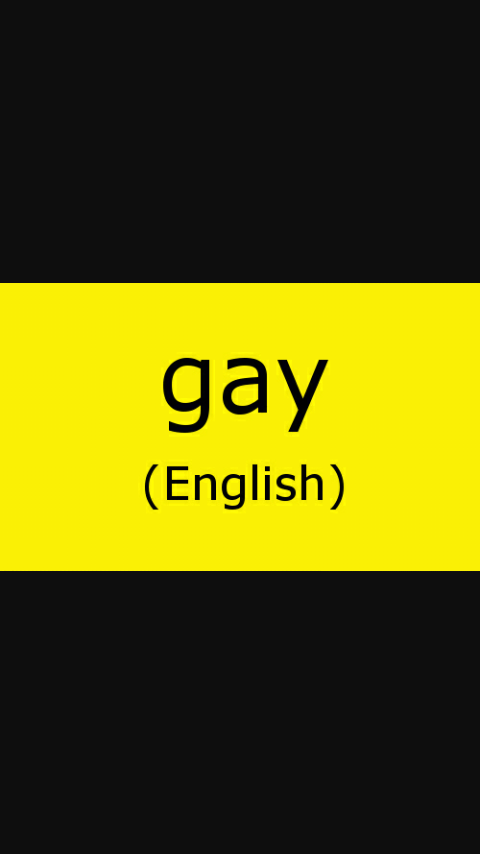How Gay came to be Gays
HOW ‘GAY’ CAME TO MEAN ‘HOMOSEXUAL’
The word “gay” seems to have its origins around the 12th century in England, derived from the Old French word ‘gai’, which in turn was probably derived from a Germanic word, though that isn’t completely known. The word’s original meaning meant something to the effect of “joyful”, “carefree”, “full of mirth”, or “bright and showy”.
However, around the early parts of the 17th century, the word began to be associated with immorality. By the mid 17th century, according to an Oxford dictionary definition at the time, the meaning of the word had changed to mean “addicted to pleasures and dissipations. Often euphemistically: Of loose and immoral life”. This is an extension of one of the original meanings of “carefree”, meaning more or less uninhibited.
Fast-forward to the 19th century and the word gay referred to a woman who was a prostitute and a gay man was someone who slept with a lot of women, often prostitutes. Sort of ironical that today a gay man doesn’t sleep with women. Also at this time, the phrase “gay it” meant to have sex.
With these new definitions, the original meanings of “carefree”, “joyful”, and “bright and showy” were still around; so the word was not exclusively used to refer to prostitutes or a promiscuous man. Those were just accepted definitions, along with the other meanings of the word.
Around the 1920s and 1930s, however, the word started to have a new meaning. In terms of the sexual meaning of the word, a “gay man” no longer just meant a man who had sex with a lot of women, but now started to refer to men who had sex with other men. There was also another word “gey cat” at this time which meant a homosexual boy.
By 1955, the word gay now officially acquired the new added definition of meaning homosexual males. Gay men themselves seem to have been behind the driving thrust for this new definition as they felt (and most still do), that “homosexual” is much too clinical sounding and is often thought of as offensive among gay people due to sounding like a disorder. As such, it was common amongst themselves to refer to one another as “gay” decades before this was a commonly known definition (reportedly homosexual men were calling one another gay as early as the 1920s). At this time, homosexual women were referred to as lesbians, not gay. Although women could still be called gay if they were prostitutes as that meaning had not yet 100% disappeared.
Since then, gay, meaning homosexual male, has steadily driven out all the other definitions that have floated about through time and of course also has gradually begun supplementing the word ‘lesbian’ as referring to women who are homosexual.
Not satisfied with simply changing its definition once a century, as early as the 1980s a new definition for the word gay started popping up among American youth where now something gay could either mean a homosexual or something that is “lame” or “stupid” or the like. This new definition was originally almost exclusively meant as an insulting term, derogatorily referencing homosexuals.
However, according to a report done by the BBC, most children are still using the word to mean “lame”, but now with having nothing to do with sexuality of any sort and also not generally meant as an insulting term against homosexuals.
Now it is used more to the effect of just saying, for instance, “That movie was gay” as in stupid, but having nothing to do with homosexuality in their minds and not generally directed at people (thus not supposedly meant to be offensive to the gay community). Whereas the origins of this new “lame” or “stupid” definition were most definitely meant to be insulting and were primarily directed at people.
The abstract noun ‘gaiety’ has somehow largely steered clear of having any sort of sexual connotation as with the word “gay”. It still keeps its definition as meaning something to the effect of “festive”.Male homosexuality was illegal in Britain until the Sexual Offenses Act of 1967. Because even mentioning someone was a homosexual was so offensive at the time in England, people who were thought to be gay were referred to as “sporty” with girls and “artistic” for boys.
Bringing Up Baby in 1938 was the first film to use the word gay to mean homosexual. Cary Grant, in one scene, ended up having to wear a lady’s feathery robe. When another character asks about why he is wearing that, he responds an ad-libbed line “Because I just went gay”.
Bringing Up Baby in 1938 was the first film to use the word gay to mean homosexual. Cary Grant, in one scene, ended up having to wear a lady’s feathery robe. When another character asks about why he is wearing that, he responds an ad-libbed line “Because I just went gay”.
At the time, mainstream audiences didn’t get the reference so the line was thought popularly to have meant something to the effect of “I just decided to be carefree.
ugandagayonmove
UGOM
ugandagayonmove
UGOM

Comments